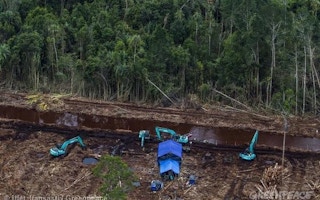Indonesia’s second largest paper company, Asia Pacific Resources International Limited (APRIL), is in a dispute with the Indonesian government over the development of environmentally sensitive peatlands.
Indonesia’s Environment and Forestry Ministry ruled on 16 October that the work plan of APRIL’s operational unit, PT RAPP, did not meet the requirements of a ministerial decree on peat exploitation introduced by the government after the devastating forest fires of 2015, which blanketed much of Southeast Asia in the worst haze pollution on record.
The decree forbids agribusiness firms which currently have crops on peatland from replanting on their lands after the current harvest cycle. They can request land from the government to substitute the plantations that are currently on peat.
When drained and dried for agriculture, peat is highly vulnerable to the fires that have blighted Indonesia and its neighbours for generations.
RAPP suspended its operations on 18 October after the Ministry said that its workplan was incompatible with its decree; this move saw 4,600 of the company’s staff put on home leave. The company also said in a statement that “tens of thousands of jobs” were at risk.
The Ministry also cancelled RAPP’s long-term work plan, known in Bahasa Indonesia as the Rencana Kerja Usaha (RKU) because it was not fully compliant with ministerial decree on peatlands. Since an approved RKU is the legal basis for a company to work, RAPP suspended its forestry operations once the ministry cancelled their plan.
However, Environment and Forestry Ministry secretary general Bambang Hendroyono clarified on Wednesday that RAPP had not been forbidden from operating, and that the company’s decision to put its business on hold had been “just their interpretation.”
After extensive discussions with the ministry, APRIL will be resuming operations, and has until 30 October to resubmit its 10-year work plan, detailing how it would manage peatland areas.
About half of APRIL’s 480,000-hectare land bank lies on peat. The company has said that it is working through a plan to move off peat, but the problem is securing viable new land to relocate its operations.
APRIL said in a statement that it is pushing for a “gradual and sequential transition” from peat to mineral soil that is “clean and clear.”
Moving off peat quickly would leave the land vulnerable to encroachment and fires, the company claimed.
Indonesia’s Minister for the Environment and Forestry Siti Nurbaya Bakar told Singapore newspaper The Straits Times on Monday that RAPP should comply with the new rules, as all other industrial plantation companies had done, instead of following its own version of the law.
She said that compliance with the rules was essential, as forest fires on drained peatlands have been a major cause of Indonesia’s haze problem.
APRIL is working through a peat management roadmap, which includes a scientific study to aid the protection and restoration of peatlands, 300,000 hectares of which the company has set aside as a conservation area.
Peat is a sensitive issue for APRIL. In 2015, an APRIL contractor was found to have been digging a canal in peat forest at Pulau Padang, which was in violation of the company’s 2014 sustainability policy.
The Pulau Padang dispute led to an altercation with Indonesia’s peatland restoration agency, BRG, and prompted environmental groups Greenpeace and World Wide Fund for Nature to back out of an agreement with APRIL to guide the company on its sustainability commitments.
While APRIL has been working on revisions to its long-term work plan, the company has been rolling out an initiative to stamp out peatland forest fires.
The Fire Free Village programme was started by APRIL in July 2015, and has since been taken up by other agribusiness firms, including palm oil giants Musim Mas and Wilmar International.
This story was edited and updated on 27 October.

















